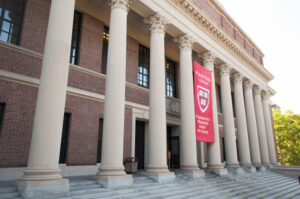
The Congregational Church, or Congregationalism, is a Protestant faith that’s committed to the autonomy of the congregation.
True to its name, the Congregational Church is governed by the congregation. Instead of being dictated by a single individual, organization, or group of church elders, the Congregational Church avoids any sort of hierarchy, maintaining that the church only answers to God. Their recognition that Christ has ultimate authority over the church is the cornerstone of their faith.
Congregational-style church governments are found in many Baptists and non-denominational churches, but Congregational churches are unique because they are affiliated with the United Church of Christ, the National Association of Congregational Christian Churches, or the Conservative Congregational Christian Conference, all of which share a common history with the New England pilgrims. In fact, the Congregational Church has long been known as the “Church of the Pilgrims” because it was founded by the Puritans who moved to the new world in search of religious freedom in the early 1600s.
Explore a Christian Ministry Degree – Request More Info Today!
The Congregational Church Has a Close Relationship with the Nation’s Top Universities
 The Congregational Church established some of the nation’s top universities. Both Harvard and Yale were founded to train Congregational clergy.
The Congregational Church established some of the nation’s top universities. Both Harvard and Yale were founded to train Congregational clergy.
Other universities founded by Congregationalists include Dartmouth University, Washburn University, the University of Vermont, Fairmount Congregational College (later Wichita State University), Piedmont University (Georgia), and more.
What Does the Congregational Church Believe?
 Each church views Scripture as its foundation, welcomes guidance from the Holy Spirit, and makes its own determinations regarding its worship, governance, and belief.
Each church views Scripture as its foundation, welcomes guidance from the Holy Spirit, and makes its own determinations regarding its worship, governance, and belief.
Many of the teachings of the Congregational Church mirror those of Evangelical Protestant churches, with a focus on the free movement of the Spirit and a primitive confession of “Jesus is Lord.”
Unlike many other mainline Protestant religions, the Congregational Church does not follow any creed. The church doesn’t see a need for any set catechism or creed because they feel that everyone has the freedom to read and interpret the Bible for themselves without coercion. As a result, the Congregational Church has long appealed to those who want to unburden themselves from the strict dogma that accompanies so many religions.
The Congregational Church believes that baptism and the Lord’s Supper are the only sacraments instituted by Christ. Infants in this religion are baptized, and Holy Communion isn’t celebrated during any given time, and is usually decided upon by each church. Historically, the Lord’s Supper hasn’t been central to the Congregational Church’s service. Hymns are prominent in church services, particularly those of the Congregationalist hymn writer Isaac Watts and the Congregational Praise (1951) hymnal.
The Congregational Church welcomes ordained ministers, with each church setting the standards for their training. However, it is common for Congregationalist ministers to receive their training in interdenominational seminaries or universities. Women have served as ordained ministers in the Congregational Church since 1917.
Because the Congregational Church and Congregationalism emphasizes the spiritual autonomy of the congregation and the congregation as a well-defined body, they believe that nothing on Earth can be more authentic than the church and the people (minster, deacons, and members) who embody it. Because of the significance of the church, the Congregational Church believes that the church must always have the freedom to obey God’s will for itself, without any outside meddling or interfering.
The Guiding Principles of the Congregational Church
The Congregational Church was founded on the following guiding principles:
- Christ alone is the head of the church.
- All church members are spiritually equal and called to the work of ministry.
- Every local church is autonomous and complete.
- Each local church is called into wider associations of fellowship.
- Believers are bound to one another in a voluntary covenant.
- Every Christian possesses full liberty of conscience in interpreting the Gospel.
- The Bible is fully sufficient as our guide in matters of faith and practice and will inspire individuals and direct the church with fresh light and truth for every generation.
The Congregational Church believes that a gathered church should remain a central element to the church. All church members are granted equal rights and an equal voice in regular gatherings that address the church’s life, and churches are mainly funded by the contributions of its members. From allocation of funds to rules and regulations, each Congregational Church works together to make its own decisions. The Congregational Church is naturally diverse, as all members possess “full liberty of conscience in interpreting the Gospel.” In fact, the Church believes that through their diversity comes strength and endless opportunities to learn from one another. Members of the Congregational Church simply agree to come together as people inspired by Christ’s life and teaching.
The History of the Congregational Church
 The Congregational Church was created out of opposition to both the Roman Catholic and Anglican Churches of England in the 1500s. These Protestant reformers believed in independent local churches that weren’t controlled by the Church of England.
The Congregational Church was created out of opposition to both the Roman Catholic and Anglican Churches of England in the 1500s. These Protestant reformers believed in independent local churches that weren’t controlled by the Church of England.
They largely opposed what they called the “Roman superstitions” — practices and beliefs practiced in the Roman Catholic Church that weren’t found in the Holy Scriptures (kneeling, genuflecting, etc.). They also opposed the power of the clergy, the numerous church rules that were reinforced by a system of bishops, and the excessive taxation on the congregation to support the Church.
Even though the Anglican Church was created oppose the Roman Catholic Church, they were the first to persecute Congregationalists of the time. Congregationalists, in an attempt to escape this religious persecution, traveled to the new world by 1620 to create a “godly commonwealth” of locally governed churches.
In 1648, Congregationalists in the Massachusetts Bay Colony created the Cambridge Platform – a formal statement designed to protect their gatherings from England interference and establish a church polity based on Scripture alone.
By the late 1700s, the Congregational Church began merging with other Christian churches who had separated from the mainline Protestant religions (Methodist, Baptist, Presbyterian). During this time, they reaffirmed their commitment to a congregational form of government.
While the Congregational Church was growing, so were the Reformed and Evangelical Churches which, by 1934, had merged to create the Evangelical Reformed Church. In 1957, the Congregational churches merged with the Evangelical Reformed Church to create the United Church of Christ.
The National Association of Congregational Christian Churches was created around this time in response to the United Church of Christ, which they felt would hinder the freedoms of its members and come with too much bureaucracy.
The Conservative Congregational Christian Conference was created to oppose what they felt was the liberal theology in other Congregational churches.
The Congregational Church has suffered a decline in membership since the 20th century, and many of the churches have become part of the Reformed family of Churches. At the start of the 21st century, there were about 2.4 million Congregationalists worldwide.









